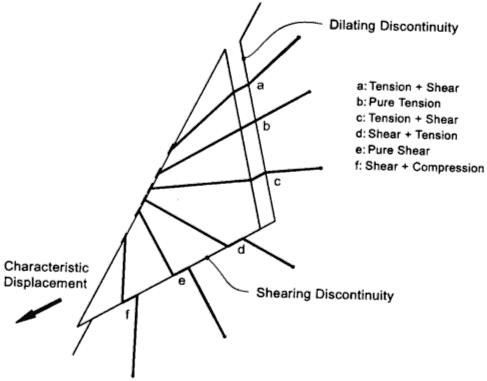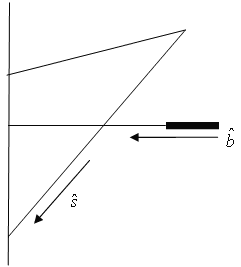Bolt Orientation Efficiency
Bolts that intersect a wedge in RocSlope2 can deform in a number of different ways, as shown in the figure below. As a result, the mechanism of failure of a bolt can be quite complicated. In order to simplify the behavior for the purpose of including support in a limit equilibrium wedge analysis program such as RocSlope2, an empirical reinforcement efficiency factor can be used.

The theoretical Tensile Capacity of a bolt at any point along its length is determined from the Bolt Force Diagram and the point at which a wedge plane intersects the bolt. This assumes that a bolt is in pure tension. However, pure tension occurs only if the bolt orientation is aligned exactly with the sliding direction or direction of movement of the wedge (see b: Pure Tension in the figure above).
If a bolt is not in pure tension but also shear, the effective Tensile Capacity of the bolt is reduced. The amount of reduction is given by the Bolt Orientation Efficiency factor, which may range between zero and one.
- If the Bolt Orientation Efficiency factor is zero, the bolt has no effect and zero force is placed into the equilibrium equations of the wedge.
- Conversely, if the Bolt Orientation Efficiency factor is one, the bolt is in pure tension and the entire capacity is added as a force in the direction of the bolt in the equilibrium equations of the wedge.
Calculation of Bolt Orientation Efficiency Factor
The Bolt Orientation Efficiency factor is calculated by relating the direction of sliding or movement of the wedge to the orientation of the bolt. In RocSlope2, there are two different calculation methods.
Cosine Tension / Shear
This is the default method in RocSlope2. With reference to the figure below, the efficiency is calculated as:
e = b̂ ⚫ ŝ
where,
b̂ = bolt direction (normalized vector)
ŝ = sliding direction (normalized vector)
e = bolt orientation efficiency

Bolt orientation and sliding direction used for Bolt Efficiency calculation
Linear Tension / Shear
With the Linear Tension / Shear method, the efficiency is calculated as:
f = b̂ ⚫ ŝ
ẑ = (0,0,1)
g = | (b̂ x ẑ) ⚫ ŝ |
e = f / (f+g)
where,
b̂ = bolt direction (normalized vector)
ŝ = sliding direction (normalized vector)
f = component of ŝ in direction of b̂
g = component of ŝ perpendicular to b̂
Bolt Orientation Efficiency Off
The Bolt Orientation Efficiency option can be turned off. To turn off the option, deselect the Use Bolt Orientation Efficiency check box in the Bolt Properties dialog.
If Bolt Orientation Efficiency is OFF, then the Bolt Orientation Efficiency factor = 1, regardless of the bolt deformation mode (A, B, C, D, E, F in the first figure above).
Bolt Efficiency and Shear Capacity
Finally, note that Bolt Orientation Efficiency is NOT used in conjunction with the Bolt Shear Capacity option. If you have selected the Use Bolt Shear Capacity option and the bolt deformation mode is D, E or F so that the Bolt Shear Capacity is applied, the Bolt Orientation Efficiency factor DOES NOT multiply the Shear Capacity. Bolt Orientation Efficiency is only used as a factor for the Tensile Capacity determined from the Bolt Force Diagram.